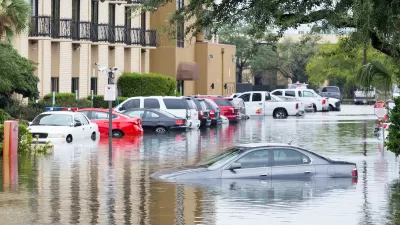New development in small Colorado towns threatens to overwhelm fire evacuation resources, raising alarm among local residents.

As populations in Western towns grow, development increasingly encroaches on fire-prone areas—and this has residents in one small Colorado community worried, write Shannon Najmabadi and Olivia Prentzel. The unincorporated town of Conifer, population 8,000, exemplifies the issues faced by communities at the periphery of urbanized areas where new developments threaten to overwhelm local water supplies, evacuation routes, and other fire suppression resources.
Between 1990 and 2010, the number of housing units in the wildland urban interface in Colorado increased 74% and more than 40% of the state’s housing units were nestled there in 2010, according to a report from the nonprofit Community Wildfire Planning Center. The acreage of the interface is projected to grow 300% by 2030 compared with 2000, according to a Colorado State University analysis.
Peter Dunbar, a former police chief experienced in fire evacuations, called the plan to add 188 new housing units to Conifer, where just one road leads out of town, a "recipe for disaster."
Residents of other Colorado towns echo these concerns, calling on their cities to include evacuation times in development permits and take steps to ensure safe evacuations in communities with limited exit routes, rough terrain, and scarce water supplies. Even as developers continue to build denser housing in zones with high fire risk, Western wildfires have grown more intense than ever and 'fire weather' days grow more and more common.

Maui's Vacation Rental Debate Turns Ugly
Verbal attacks, misinformation campaigns and fistfights plague a high-stakes debate to convert thousands of vacation rentals into long-term housing.

Planetizen Federal Action Tracker
A weekly monitor of how Trump’s orders and actions are impacting planners and planning in America.

In Urban Planning, AI Prompting Could be the New Design Thinking
Creativity has long been key to great urban design. What if we see AI as our new creative partner?

King County Supportive Housing Program Offers Hope for Unhoused Residents
The county is taking a ‘Housing First’ approach that prioritizes getting people into housing, then offering wraparound supportive services.

Researchers Use AI to Get Clearer Picture of US Housing
Analysts are using artificial intelligence to supercharge their research by allowing them to comb through data faster. Though these AI tools can be error prone, they save time and housing researchers are optimistic about the future.

Making Shared Micromobility More Inclusive
Cities and shared mobility system operators can do more to include people with disabilities in planning and operations, per a new report.
Urban Design for Planners 1: Software Tools
This six-course series explores essential urban design concepts using open source software and equips planners with the tools they need to participate fully in the urban design process.
Planning for Universal Design
Learn the tools for implementing Universal Design in planning regulations.
planning NEXT
Appalachian Highlands Housing Partners
Mpact (founded as Rail~Volution)
City of Camden Redevelopment Agency
City of Astoria
City of Portland
City of Laramie





























